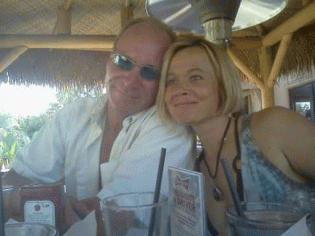
kodda/Getty Images Plus
“I was close to dying, you know? And for nothing, for nothing,” said Manfred Grimm. When we spoke on the phone last week, the 51-year-old German national was being held in the Adelanto Detention Center, a Southern California immigration prison run by the private prison company GEO Group. A week and a half earlier, Grimm had suffered a heart attack at the center. He claimed that after he was taken to a nearby hospital he almost bled to death. He believes that all of this could have been avoided if he’d received better treatment at Adelanto—a facility with a record of complaints about poor medical treatment where three detainees have died this year.
Eight years ago, Grimm met his girlfriend, Silke Brown, through Facebook. He lived in Germany. She lived in California. In 2011, he boarded a flight to join Brown and her two teenage children in the United States through a visa waiver program, good for 90 days. But he never left. Previously a police officer in Germany, Grimm worked as a handyman in the United States. The immigration system caught up with him in 2016 after he was arrested and charged with assault with a deadly weapon. Grimm insists he acted in self defense: He threw a bottle at a man who had attacked him. (Brown relates the story in the same way.) He spent time in a local jail and was then transferred to Adelanto on May 19 to await deportation proceedings.

According to Grimm, his problems in Adelanto began when he was placed in administrative segregation, a form of solitary confinement, after trying to make a phone call to Germany. One evening, Grimm told me, the guard had fallen asleep. When the guard woke up, he accused Grimm of trying to escape and placed him in segregation. ICE spokeswoman Virginia Kice says that Grimm was put in segregation because he “made statements to GEO personnel indicating a possible desire to escape from the facility.”
“That day we talked at 11:51 a.m. and I never heard from him again—for five days in a row,” says Brown. “He just disappeared, and that’s not like him.” Brown says she repeatedly called the detention center and Immigration and Customs Enforcement (ICE) asking about her boyfriend and was not told that he was in the hospital until four days had passed. “They wouldn’t tell me if he was in the hospital, if he was alive, nothing.”
Grimm, who had another heart attack as a young man, was scheduled to see a doctor the next morning, but he said no one came for him. Guards found him later that afternoon facedown in his cell. They rushed him to Victorville Hospital where he remained for nearly a week. At one point, medical staff inserted an IV in his arm and left him in a room with ICE officers. In the middle of the night, Grimm recalled waking up because “everything was wet.” When a nurse arrived and turned on the light, he saw that he was covered in his own blood.
“They put me in the hole so I didn’t see a doctor. And then they took me to the hospital and they slept on the job. And then I almost died in my own blood,” said Grimm over a spotty phone connection from Adelanto. “I can be happy I am still alive.”
Adelanto Detention Center has a history of poor conditions and inadequate medical treatment. In 2012, an investigation by the Department of Homeland Security’s Office of Detention Oversight found lapses in communication among the facility’s medical staff and delays in providing medical treatment to detainees. The same year, a detainee named Fernando Dominguez died of pneumonia at Adelanto. Later, 29 members of Congress sent a letter to ICE and federal investigators saying that his death was the result of “egregious errors” committed by the center’s medical staff. A 2015 federal review found more problems at Adelanto, including inexperienced medical staff, high medical staff turnover, and limited laboratory services, all of which led to delays in medical treatment.
In response the federal review, GEO hired Correct Care Solutions, a subcontractor, to provide medical services at Adelanto. Correct Care Solutions has close to ties to GEO; its CEO, Jorge Dominicis, was previously the president of GEO for 10 years. As Southern California Public Radio reported last year,Securities and Exchange Commission records show that GEO continued paying Dominicis as a consultant after he left the company in 2014.
Since switching medical care providers, Adelanto has continued to receive complaints. A May report by Human Rights Watch and Community Initiatives for Visiting Immigrants in Confinement (CIVIC) highlighted Adelanto Detention Center in its finding that “dangerous and substandard medical care” and “systematic failure” have caused preventable deaths and unnecessary suffering at immigration detention centers. “We’ve been monitoring that facility since 2012, and medical care has always been the top complaint we’ve received from people in detention,” says Christina Fialho, the executive director of CIVIC. This year alone, she says, her group has received “an obscene amount of medical complaints since January, with multiple people experiencing heart attacks who had no prior issues with their heart or high blood pressure.”
When Grimm was released from the hospital and taken back to Adelanto, he alleged that he was put in segregation after contacting the German consulate in Los Angeles. He believed it was done to keep him quiet. Kice, the ICE spokeswoman, says that following his hospitalization, Grimm was held in administrative segregation for an additional day before being put back in the general population. (Asked for comment, GEO referred all questions to ICE. ICE did not comment on Grimm’s medical allegations.)
Grimm was detained for two months. Two days after we spoke, on July 7, he was deported to Frankfurt, Germany, on a commercial flight. His removal has forced Brown to make drastic new plans. “I’m going back eventually, too,” she says. Her youngest daughter is in college, and she wants to be here for her. “I will go back and forth during that time, and eventually I will stay in Germany,” she says.
Brown says that her boyfriend’s heart attack and medical treatment were not the only troubling aspects of his time at Adelanto. “The first night he was there he was asking for water. Two hours later, he still didn’t have any. He asked again, and he was handed an empty cup. I heard they were told they could drink the toilet water.” She adds, “They might be here illegally, but they’re human beings.”
In June, detainees at Adelanto went on hunger strike to demand access to clean water and better medical care. Last week, 45 detainees—eight of them members of a refugee caravan from Central America—began a 72-hour hunger strike to protest the lack of adequate medical care at Adelanto, among other complaints. It is the third hunger strike at Adelanto this year.
















